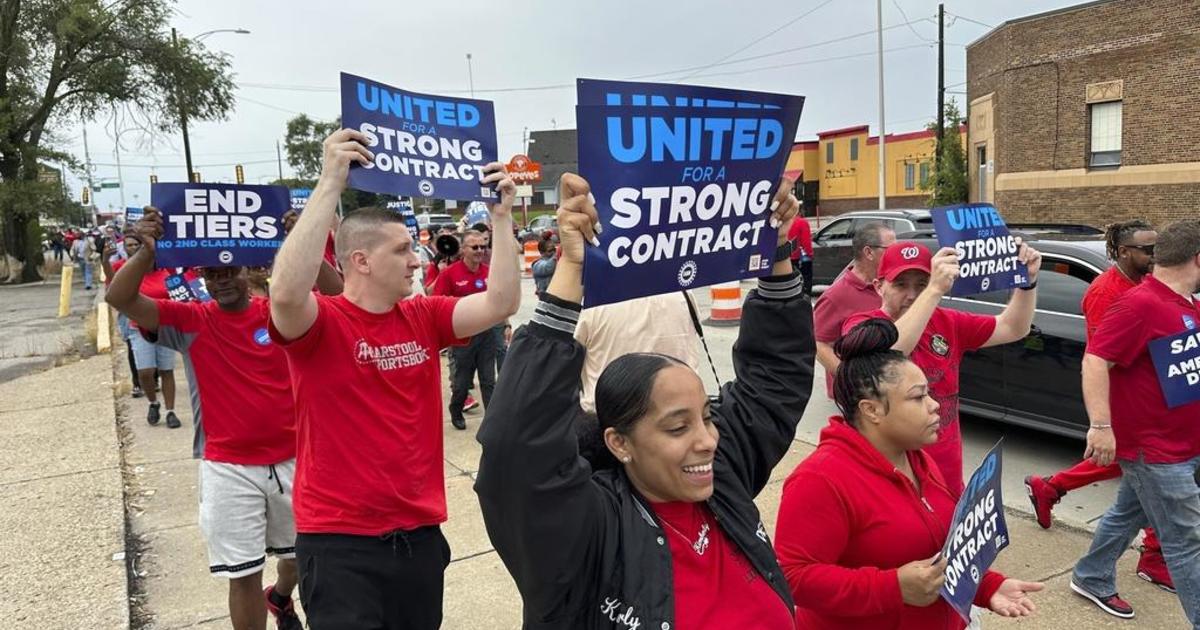The clock is ticking for Detroit’s Big Three automakers to ink a new labor contract and avoid a work stoppage that could cost the U.S. economy billions of dollars.
Ford, General Motors and Stellantis (formerly Fiat Chrysler) have until 11:59 on Thursday to reach an agreement or face a potential strike by more than 140,000 members of the United Auto Workers union. The labor negotiations come as car manufacturers are investing billions of dollars to produce electric and hybrid vehicles, a vital market for the companies.
If both sides fail to strike a deal in the next two days, it could mark the first UAW strike since auto workers walked out on GM in 2019 and culminate in the nation’s largest strike by active employees in 25 years.
Here’s what to know about a possible UAW strike.
What the UAW wants
Topping auto workers’ demands is a 46% pay raise over four years. Full-time assembly plant workers at Ford and GM currently make $32.32 an hour, while part-timers earn about $17 an hour. At Stellantis, full-time employees earn $31.77 an hour and part-time workers make almost $16 an hour.
Automakers can afford pay raises because each of them has recorded hefty profits this year, UAW President Shawn Fain said.
“After a decade of hard work by our members, they’ve had massive profits and continued massive profits — $21 billion in the first six months of this year between the Big Three,” he told told reporters in Detroit last week. “Our workers deserve their share of equity in this and they’re not getting it.”
Although a sharp pay hike would benefit workers, some experts think it could lead to higher prices for electric vehicles.
“The big issue for GM and Ford as well as investors is if anywhere near a 40% wage increase gets approved,” analysts with Wedbush Securities said in a report this week “This will be a major headwind on the cost front and ultimately in some way be passed down to the consumer and through EV prices.”
Aside from pay, the union also wants management to limit the use of temporary workers and to impose forced overtime. UAW members said they’re looking for more time off, including a four-day workweek, and are asking for additional job protections, including the right to strike over plant closings.
What automakers have offered
So far, the automakers’ latest counteroffers include a much more modest wage hike. Stellantis has offered a 14.5% pay bump over four years. Ford and GM have offered roughly 10% raises for its employees over four years. UAW leaders have called the proposals unfair and disappointing.
The UAW and automakers continued their negotiations Tuesday, but for now the sides remain far apart on wages and the working conditions at EV plants, said Benjamin Salisbury, an analyst at Height Securities.
“While the continued exchange of counterproposals between the union and the automakers shows progress, it does not eliminate the risk of a strike,” Salisbury said Tuesday in an investors’ note.
Fain told CNN on Monday that negotiations are progressing but that both sides are divided on cost of living allowances and job security.
“Our members are being left behind not just with the transition to EV, but just with product placement, retirement security,” he said. “There’s a lot of issues feeding into this.”
How a strike could impact car buyers
The average new vehicle in the U.S. costs $48,451, according to August data from Kelley Blue Book. A UAW strike that lasts two weeks could push up prices for new vehicle by 2%, automotive consulting firm J.D. Power told Reuters.
That’s because a worker walkout would choke production for new Ford, GM and Stellantis models. With sudden uncertainty on when new cars would arrive on their lots, car dealerships would likely raise the sticker price for their existing inventory.
Auto production at the Big Three could fall by 150,000 vehicles per week in North America, and prices would climb soon after, said Garrett Nelson, an automotive analyst at CFRA Research.
The UAW’s contentious talks with Detroit automakers comes as a large swath of unionized workers in a range of industries pushes for better pay and working conditions.
Museum workers in Chicago, police officers in Los Angeles, thousands of American Airlines pilots, college professors in New Jersey and Oakland, California hospital workers have all seen pay increases. UPS drivers in August approved a five-year contract that brings their average annual pay to $170,000.
“With the recent UPS union deal sealed, this puts more pressure on the UAW leadership to deliver a big win,” Wedbush analysts said.
